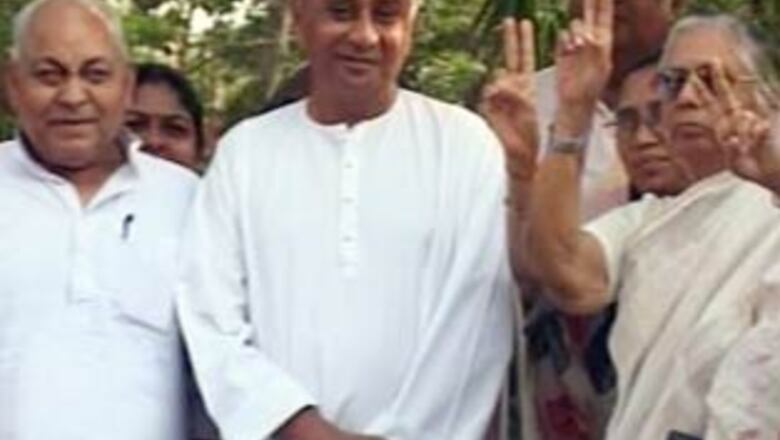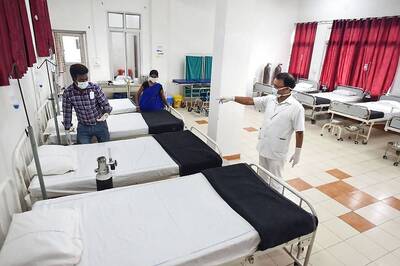
views
Bhubaneswar: He is not very fluent in his mother tongue, Oriya. He speaks little and is often reticent. But Naveen Patnaik's success in both parliamentary and state assembly elections has declared loud and clear that the Orissa chief minister is now one of India's strongest and most charismatic leaders.
The 62-year-old created history by leading the Biju Janata Dal (BJD) - named after his father Biju Patnaik - to victory and retaining power in the state for the third time in a row, but this time on his own strength.
The BJD beat anti-incumbency and secured more than 100 seats in the 147-member assembly and 14 of state's 21 Lok Sabha seats against 61 and 11 respectively in 2004.
The sweeping victory came as a surprise particularly after the former student of India's elite Doon school suddenly split from his 11-year-old political ally, the Bharatiya Janata Pary (BJP), in March over seat-sharing arrangements.
The BJD-BJP combine, which broke up a month ahead of the elections, had ruled the state for two consecutive terms. But Patnaik's gamble of going it alone paid dividends.
By breaking away from the BJP-led National Democratic Alliance (NDA) over the communal conflict that rocked the state last year, in which 38 people, mostly Christians, were killed, Patnaik successfully managed to convey that he wanted development and peace but was being hobbled by his allies.
"The stand he took in the aftermath of the riots helped him emerge as a strong decision maker, which the people appreciated," a political analyst said.
Internal bickering in the opposition Congress and BJP contributed to his success. Both the parties were busy sorting out their own internal problems rather than making attempts to capitalise on the real issues.
"Maoists were having influence in only a couple of districts a decade ago and have already expanded their base to more than half of the state but nobody raised it prominently in their manifestos," said eminent journalist Prasant Patnaik.
"Also, nobody talked about the impact of the economic recession on the state. The rivals also failed to project an alternative to him. But it's also true that Patnaik managed to make a mark in the hearts of urban and rural voters as well as poorer people by taking several development initiatives."
"If you visit the state capital Bhubaneswar these days you can see widen roads with a cosmopolitan look," said C Baral, a non-resident Oriya professor, who is now settled in the US.
"Besides, during his tenure the state attracted highest foreign direct investment. The state is becoming a hot destination for providing investment opportunities in sectors such as power, steel, tourism, and IT," said Baral, who is on a visit to his home state after seven years.
The poorer voters supported the chief minister for the rice the government provided them at two rupees per kg.
"At least 55 lakh (5.5 million) families are benefiting from this scheme," BJD secretary general Damodar Rout told IANS.
"He also empowered nearly four million women, helping them to form self-help groups and engage themselves in economic activities."
The campaign, selection of candidates, picking up the right issues and mobilising workers right from the start of polls to counting day - the BJD was systematic in all compared to its opponents, say analysts.
Pyarimohan Mohapatra, a bureaucrat-turned-politician who is also a BJD Rajya Sabha MP, worked behind the scenes without any official position in the party, said an analyst.
Mohapatra said the BJD began preparations for the polls three years back and gradually increased its presence in all the areas it was weak in. The chief minister was the only star campaigner of the BJD and he campaigned for nearly 11 hours every day, said party sources.
Above all, Patnaik's simplicity, honesty and devotion to work appear to have played a role. He never appeared to lead a life of luxury although he spent many years abroad before his father's death.
A white kurta and simple slippers were his routine wear. Patnaik, known as Pappu to his friends, is a bachelor and an alumni of the prestigious St. Stephen's College of Delhi University.
He is also the author of three internationally-known coffee table books - A Second Paradise, A Desert Kingdom: The People of Bikaner" and Garden of Life: An Introduction to the Healing Plants of India. One of these books was edited by Jacqueline Onassis.

















Comments
0 comment